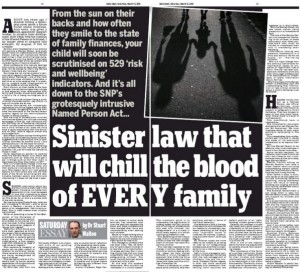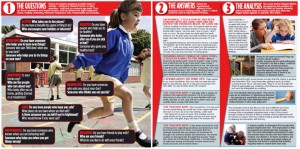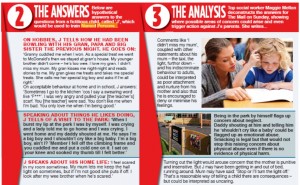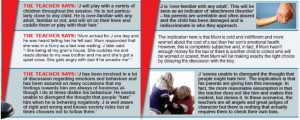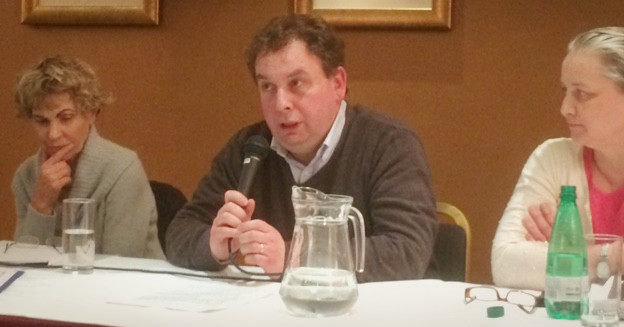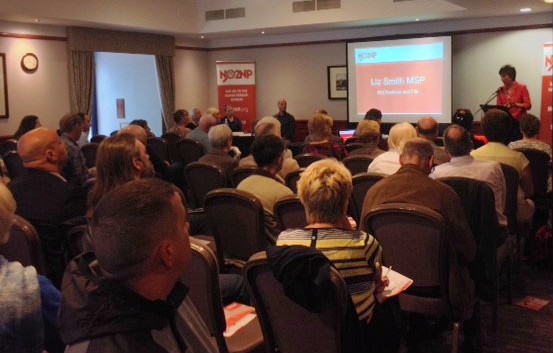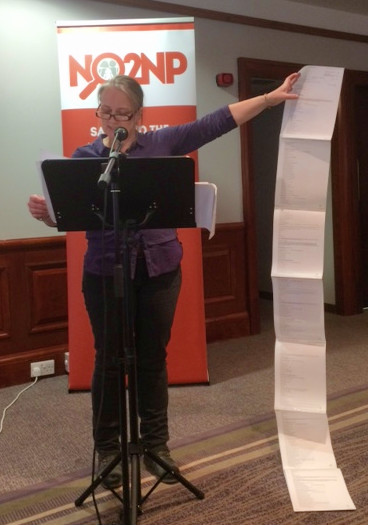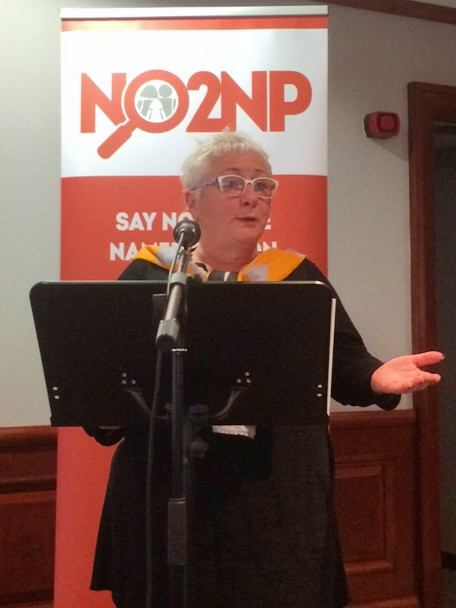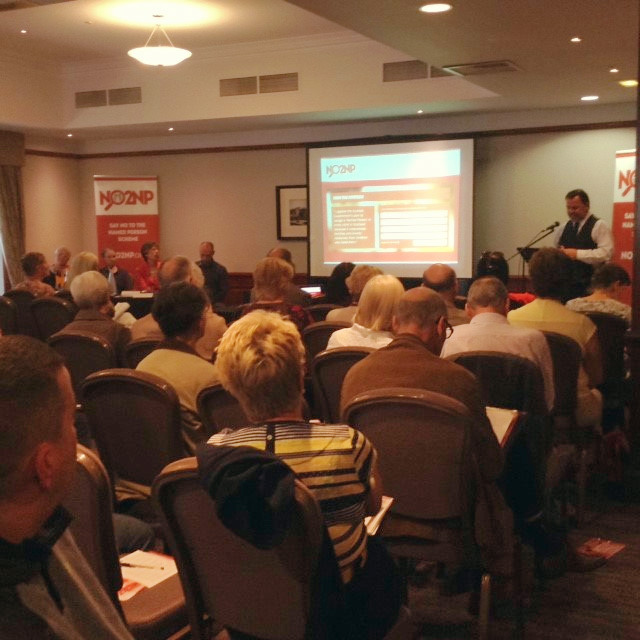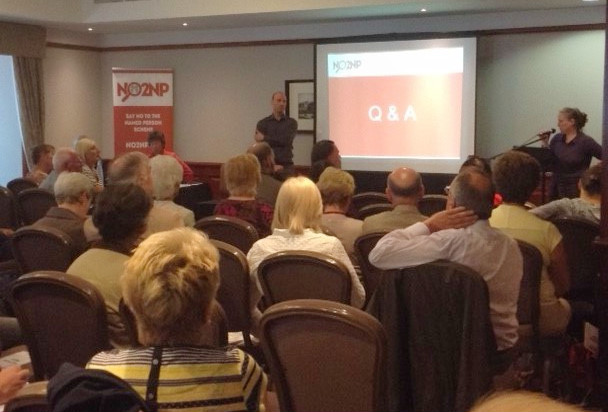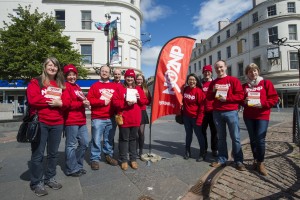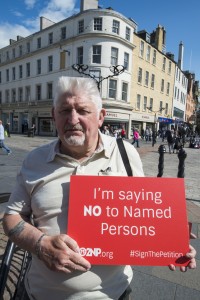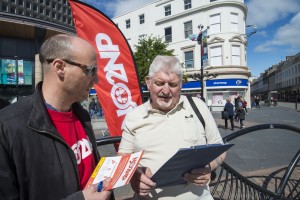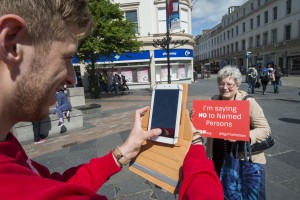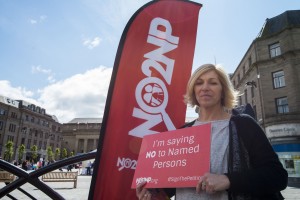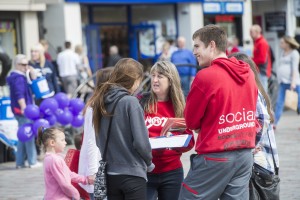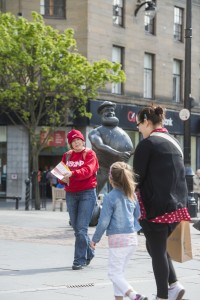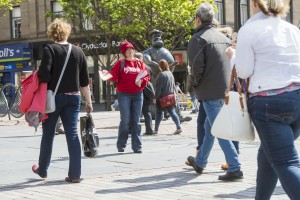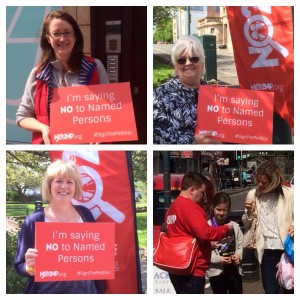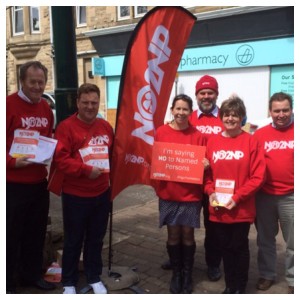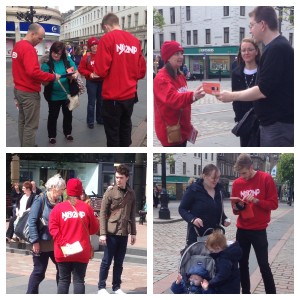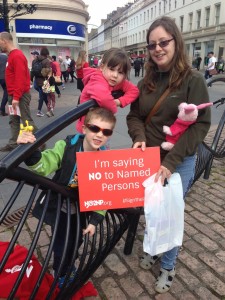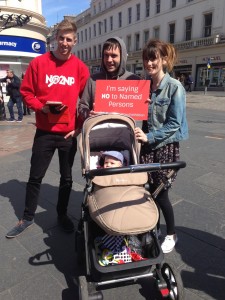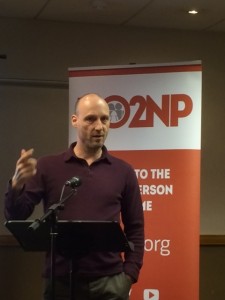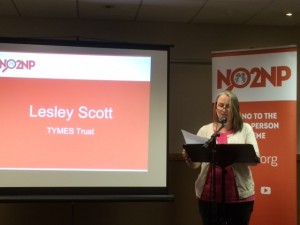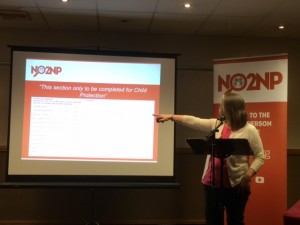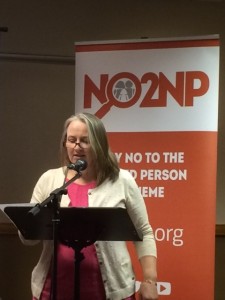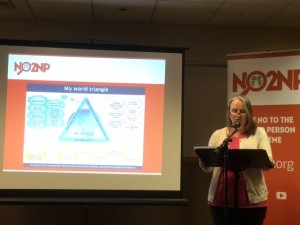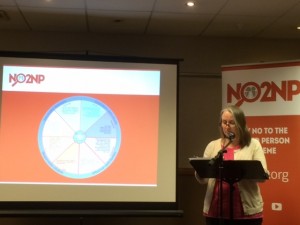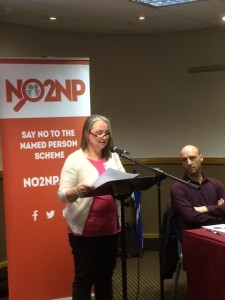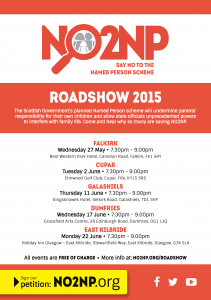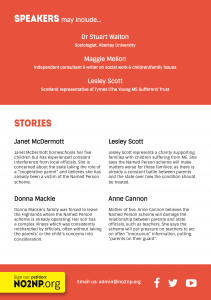Blog
Keeping you up to date on the progress of the Named Person scheme and the NO2NP campaign.
NO2NP ROADSHOW: KILMARNOCK
Posted 9 years agoThe Dean Suite of Kilmarnock’s Park Hotel was full on Wednesday night for the latest stop for the NO2NP Roadshow. We even had a journalist and photographer from a national newspaper turn up! Word about our roadshow events is certainly getting around.
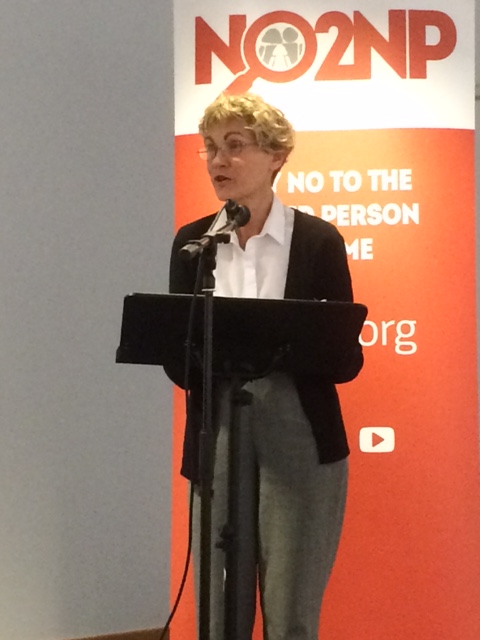
After a video was shown from last week’s Question Time in Aberdeen (where the Named Person was discussed), community paediatrician Dr Jenny Cunningham gave the first talk. She said that a child’s wellbeing (something nowhere defined in the legislation) is going to be assessed and judged, not by parents, but by health visitors, teachers and social workers.
Jenny continued: “The assumption is that parents are incapable of ensuring their children are safe and healthy and happy – and incapable of accessing the various services without the assistance of a third party.” She also expressed her concern about information sharing with various agencies and third parties and the creation of a central database: “Who controls it? Who can access it? What will happen to all the information on it?”
She finished by saying that the Named Person scheme “undermines, not supports, parental authority. Parenting is not some formulaic prescription of right and wrong practices: it’s all about parents’ relationship with their children”.
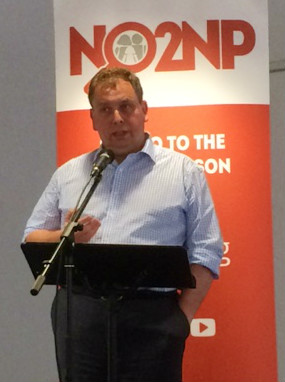
Next up was Dr Gordon Macdonald, CARE for Scotland’s Parliamentary Officer. He explained the reasons behind NO2NP’s opposition to the Named Person scheme, which are really threefold. First, it’s universal in its nature – it’s not just for a few vulnerable children and there is no opt-out – and no opt-in either. Secondly, it’s about the nebulous concept of wellbeing, not welfare (which is defined in law as significant risk of harm or neglect). Wellbeing is much harder to define, indeed there is no definition of it in the Act. And the third reason is the widespread data sharing that will take place, for which there is no opt-out. Despite Nicola Sturgeon’s assurances that the scheme is not mandatory, the data sharing aspect will be universal and compulsory, with no consent required for the sharing of personal and sensitive information.
Gordon’s children’s school recently sent him a letter which said: “It is our practice to share information”, which is far removed from the legal requirement of “strict necessity” for such information sharing. If parents refuse to cooperate, then that itself becomes problematic. Gordon went on to say that the ideology behind the scheme is that children’s groups see children as being fully autonomous, when in fact they are not.
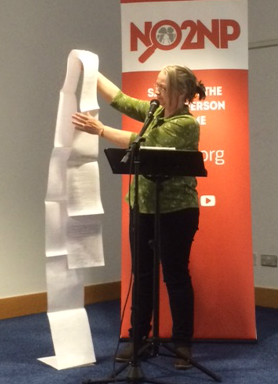
Lesley Scott from TYMES Trust then spoke about the fact that children and young people must show progress in the eight areas of wellbeing (SHANARRI) in order to be assessed as doing well now and in the future. But even supporters of this scheme cannot find the words to explain the concept at the heart of the Named Person. Lesley went on to say that “in East Ayrshire you are part of the AYRshare model for health and social care collaboration.
NHS Ayrshire and Arran along with North, East and South Ayrshire Councils have access to shared files which are created by practitioners based on a child’s NHS number. ‘At the push of a button’ practitioners can ‘push’ information on to AYRshare. Police are also on AYRshare and there has apparently been a successful test in Dalmellington involving GPs, pharmacy, health visitors and education – this trial is being extended to Loudon.”
Lesley had referred to a chronology of a child’s life that health visitors will use and this timeline of ‘significant events’ is one of the documents that will be shared through systems like AYRshare. “But what is a ‘significant event’?”, Lesley asked. She then produced another ‘non-exhaustive’ guide from the Government, which includes:
• Positive or negative changes in family circumstances, e.g. housing, birth of a sibling, emotional wellbeing
• Childhood illnesses
• Dates of immunisations and screenings
• Physical and mental health and wellbeing of child, parents/carers
• In Perth and Kinross, parental non-engagement is also classed as a significant event
In other words, she concluded, anything and everything will be logged – and shared.
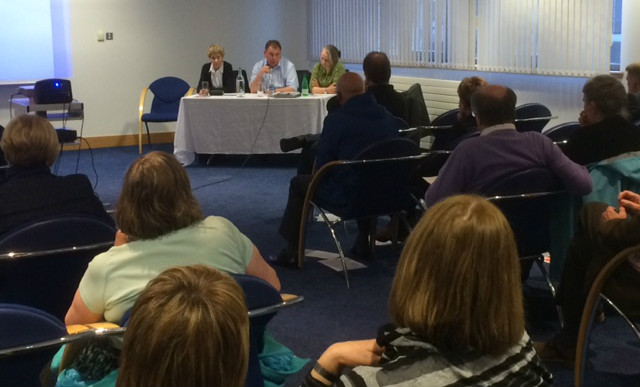
After showing a video about the history of the NO2NP campaign, Nigel Kenny suggested some ways in which people could be involved, before Dr Stuart Waiton from Abertay University hosted an extended Q&A.
Several people signed up as volunteers and a local team will be in Kilmarnock’s town centre this Saturday for our latest Action Day. If you live in the area, please come and say hello to them!
Dr Stuart Waiton: Sinister law that will chill the blood of EVERY family
Posted 9 years agoFrom the sun on their backs and how often they smile to the state of family finances, your child will soon be scrutinised on 529 ‘risk and wellbeing’ indicators. And it’s all down to the SNP’s grotesquely intrusive Named Person Act…
By Dr Stuart Waiton, published in Scottish Daily Mail, 05 Mar 2016
About ten years ago I started writing a dystopian novel about a future world where everyone, from birth, was given a state-appointed ‘support worker’ to monitor their development. Now I find, with the creation of the Named Person in Scotland, I no longer need to imagine this scenario. By August, it will be a reality.
By then, every headteacher in our schools will become a Named Person. And every health visitor will likewise become a Named Person, visiting new mothers and fathers eight times in their child’s first year alone, to assess not only the health of the baby but the ‘healthiness’ of you as a parent and considering your financial situation.
Every professional who has any dealings with a child, or with an adult who has children, will be trained to inform the Named Person if they have any ‘concerns’.
But these are not concerns about a serious risk of neglect or abuse. These are concerns about ‘wellbeing’ – one of the most flexible and loose concepts imaginable, a definition so wide-ranging that it is possible to imagine state investigations of families based on almost anything.
From the sun on their backs to the food they eat, the new technologies they indulge in and especially their relationships with family and friends, almost every aspect of a child’s life is being re-imagined as a ‘risk’.
Instead of at-risk children being a small minority, the presumption – say critics – is that all children are at risk.
Parents themselves are increasingly regarded as one of the biggest risks to their own children, struggling as they are with what the architects of the Named Person scheme regard as the near-impossible burden of being a parent.
The training of professionals involved with the new system will include a working knowledge of the 221 risk indicators and the 308-long list of wellbeing indicators, which include questions about whether or not a child ‘smiles a lot’; does the child have a ‘good relationship with the family’ and do they ‘receive regular praise and encouragement’.
Bob Fraser, a health adviser working with a forerunner of the Named Person scheme, suggested that a lack of hope, love, or spirituality, provided by parents could – and perhaps should – be the basis for action.
This, he noted, would mean intervening with children who are ‘not just the usual suspects, not just for those we identify as those in need’.
Other attempts to explain to parents what the Named Person is all about ask questions such as: ‘Does the child get a say in things such as how their room is decorated and what they watch on TV?’
This is a fundamental change in the way children are considered by the state, one with profound implications for the family unit. The state’s remit will now extend beyond our front doors and into the very heart of the family, scrutinising the relationship between parent and child and intervening if it does not like what it sees.
Sharing information about you and your child is enshrined in the system. Concerns, no matter how apparently trivial, must be passed on and this imperative to share over-rides normal barriers of confidentiality. The driver for all this is a pivotal shift in the way we think.
For the sociologist Frank Furedi, what we are witnessing in British – and to some extent in Western – society is the emergence of an exaggerated ‘ risk consciousness’. This is most intense when children are involved.
Writer on parenting cultures Dr Jan Macvarish, of the University of Kent, argues that this risk consciousness surrounding children has been further assisted by the expanding category of ‘abuse’ and ‘neglect’.
‘Behaviour which would once have been regarded as within the range of family experiences, such as children becoming overweight or parents getting angry and using moderate chastisement, is now categorised with reference to ideas of risk, abuse or neglect.’
This expanding category of abuse can be seen clearly in relation to emotional issues, where tensions and difficulties are being recategorised as forms of abuse.
This has led to calls for a ‘Cinderella Law’ to punish parents regarded as inflicting emotional harm on their children.
Dr Ellie Lee, also from the University of Kent, is an important critic of our growing parenting industry.
She says the tendency to view the world and our experiences through the prism of risk has meant the idea of the ‘child at risk’, which once related to a very specific group of children, has become a category increasingly applied to all children.
So for many people, this new state guardian is seen as a menace, an authoritarian reflection of the expanding nanny state.
However, for those in favour, the Named Person is simply about providing better services and support to parents and children alike.
The point is, what it means to provide ‘services and support’ to parents and children means something very different from what it used to.
Author Professor Nigel Parton, an expert in social work services, has observed that over the past two decades the state and state professionals have changed their focus and understanding when dealing with children.
We are no longer talking about a child any more, he explains. Rather, we are now always considering the ‘at-risk child’.
The message to professionals has been clear: ‘Yes, we know you’re here to teach children or to heal them or to help the family access services. But in your line of duty, first of all you must understand that you must be safeguarding children.’ You must, first and foremost, ensure that every child is safe.
At one level this appears reasonable. Who wouldn’t be interested in a child’s safety?
The important point is to understand the significance of making safety the No.1 priority and of turning all professionals who deal with children into ‘safeguarders’ in a climate in which every aspect of a child’s upbringing presents a risk.
This expanding concern about risks within childcare professionals is that the risk management of children has become a political priority.
This has been assisted by the change in politics. Rather than conviction politics dealing with big ideas, we have moved towards a micro-managerial approach that shifts the focus of state attention away from big issues and ideas onto the minutiae of everyday life.
There is a tendency to understand social problems, and their solutions, entirely in terms of individual behaviour.
One example of this is the way it has become commonplace for our leaders to increasingly represent parenting as the ‘single most important cause of impaired life chances, outstripping any other factor’, as Dr Lee argues.
So children today are more likely to be looked at as being ‘at risk’ by our safeguarding professionals and what is understood to be a risk is expanding all the time.
Add in micro-managerial politicians increasingly concerned with the risk management of children’s lives and the outcome, Professor Parton argues, i s that the state becomes obsessed with prevention. Preventing harm becomes the default position of all ‘rightthinking’ modern governments.
Parents, too, are seen in a new way today and a good parent is understood to be one aware of all the potential risks and harms their children face. At the same time, parents are understood to be a potential risk – arguably the most important ‘risk factor’ in a child’s life.
This is one of the reasons David Cameron has argued that all parents should have parenting classes.
The importance of the family as a private institution where people take full responsibility for their children and where individuals learn what it means to be responsible is lost within this scenario.
The family, once a no-go area for government and professional involvement, disappears or is diminished. With the Named Person we see these trends being played out in a more extreme form. The role of the Named Person is to oversee the ‘wellbeing’ of all children, to share information with other prof essionals who must be trained to understand their role in overseeing their wellbeing.
Information sharing and potential intervention in a child and family’s life will be based on ‘wellbeing concerns’.
This is a major change from the previous benchmark for intervention based on evidence of ‘significant risk of harm’. The bar has been substantially lowered to allow and even encourage professionals of all descriptions to investigate, or share information about, families.
The whole basis of the Named Person is predicated upon the understanding that ‘information on less critical concerns about a child’s wellbeing must be shared’.
Health visitors who act as a Named Person, say official guidelines, must share information to support or safeguard a child’s wellbeing. They are obliged to pass on any and every issue, ‘even where there is a duty of confidentiality’. The watchword here is intervention.
The consultation document discussing the new Named Person Bill explained: ‘ We must intervene earlier to stop major problems developing in the future.’
This necessitates that professionals get involved in issues and areas of life previously understood to be beyond their remit.
For the Named Person to be effective, they must intervene in more minor issues more often.
Some believe teachers, for instance, won’t have time to do this – but if they do not, it contravenes their duties as a listed, legal Named Person.
Health visitors acting as Named Persons now have a wider ‘ health’ remit including breastfeeding benefit awareness and inquiries about family finances and money worries.
Even before a baby is born, core issues to be discussed will include promoting sensitive parenting, raising awareness about the value of talking, stroking and singing pre-birth and raising awareness about second-hand smoke.
The Scottish Government is not lying when it says the Named Person is about services and support for children and parents.
It is simply that the child they see is presumed to be a ‘child at risk’ and the ‘responsible’ parent is a risk manager who recognises the need – indeed ‘aspires’ – to have professional support.
Support and services are less about things we want and more about the responsible, riskaverse attitudes and behaviours the Government believes we should have.
And if you think safety nets are in place to make sure you don’t fall foul of a mistake or malicious report, think again.
Scottish Public Services Ombudsman Jim Martin has written to ministers to say the system f or complaints by unhappy parents is ‘ outdated and out of step with modern complaint handling’.
Our rights are being transformed from the right of privacy and autonomy to a right to receive support and surveillance from experts and risk managers to help us with the apparently impossible task of being a parent.
Stuart Waiton is senior lecturer in sociology and criminology at Abertay University.
Read more by Dr Stuart Waiton:
Third Way Parenting and the Creation of the “Named Person” in Scotland: The End of Family Privacy and Autonomy?
SAGE OPEN, 26 February 2016
Would your family pass the latest Named Person ‘Orwellian’ state testing?
Posted 9 years agoIs your home cosy? Do your parents make you feel special? Who clothes you and cooks for you? These are just some of the questions nursery kids could be asked by Named Persons in surveys proposed by local councils.
And they plan to store all the harvested confidential information on one giant council database! Hang on a minute…!
Is it not obvious to all that this is fundamentally wrong and open to misuse?
Sample questions and potential answers are being used in Named Person training sessions to teach state officials how to subtly draw out information from children, interpret the answers, record it on a database and identify potentially ‘at risk’ kids.
One such system called “What I Think” has been developed for use with children from nursery up to age 8. Officials can select information from conversations with the child, and also drawings, photographs and recordings.
In the training Named Persons are encouraged to obtain information in a ‘natural’ way so that children don’t notice they are being questioned.
Sample scenarios designed to show Named Persons when a child could be deemed ‘at risk’, included a child not missing their mother when they stayed overnight at their granny’s, or a child being shouted at by their father after having an accident when playing alone in the park.
Maggie Mellon, a top social work consultant, Vice Chair of the British Association of Social Workers and former director of charity Children 1st, analysed the proposed system.
She told the Mail On Sunday: “The well-being indicators in this tool are clearly being used as a test of parents. They are not really about the child’s view, as there is no attempt to measure the child’s happiness or creativity.
“The examples given imply the nursery or school is a neutral place staffed by experts and the home is a hotbed of risk. In fact, most parents can tell you the stories that children bring home of shouting nursery workers, horrible, scary teachers and mean other children. Sometimes they just need to be heard and comforted and encouraged to see the other person’s point of view, although sometimes there is a need to act.
“But”, she commented, “parents don’t get to write down these people’s names and put them on a national database for other parents to have a good read, and add their own damning stories. Parents have to think very carefully about how to respond to what children say and how not to make things worse with a teacher who clearly does not like their child.
Maggie stated: “The examples given also encourage the teacher and key worker to record very positive things about themselves and not about parents. Would the key worker record that the child told them: ‘I hate you, you are mean’? Bias in key workers might be against parents who are poor, black, single, gay or posh… there is no warning of this in the guidance.
She warned: “The fact that these actually very biased and partial anecdotes will be going on a national database is extremely worrying and should make everyone sit up and say ‘No’. Overall, this is a crude tool with no validity – but it will be used and the information interpreted as evidence of child abuse or neglect.”
Dr Stuart Waiton, senior sociology lecturer at Abertay University, said: “A major problem with the Named Person professionals is that they appear to have lost any sense of the family as an important private institution for society. Trust, loyalty and privacy in their warped eyes are transformed into secrets being hidden ‘behind closed doors’.
He added: “Once we see every child as vulnerable and every family as potentially toxic, the result is that professionals see less of a problem with interfering in the private lives of children and parents.”
A NO2NP spokesman described the situation as ‘creepy’, and warned: “Psychologically manipulating youngsters so you can squeeze confidential information out of them is fundamentally wrong – but to store all this information on a giant council database is astonishingly foolhardy.
He added: “Parents are going to have to tell schools and local authorities to stop spying on their children. It really is beyond time that the Scottish Government called a halt to this whole charade before they do any more damage. It’s Orwellian, it’s immoral and it has to stop.”
DR STUART WAITON: IF I COULD SCRAP ONE LAW…
Posted 9 years agoLast year the Institute of Ideas, as part of their Election 2015 State of the Nation debates, asked a mix of commentators to suggest the one law or policy – existing or proposed – they would like to scrap.
Dr Stuart Waiton was one such commentator and he took the opportunity to talk about why he would scrap the Scottish Government’s Named Person legislation. Read the full article below.
A state-appointed guardian for every child? No thanks.
By Dr Stuart Waiton
Scotland’s ‘named person’ legislation means constant intrusion into family life.
In Scotland, we have a new law that means every child from birth (in fact, before birth) will be given a state-appointed guardian – a ‘named person’ – to oversee his or her interests – in particular to oversee their ‘wellbeing’ and to ensure they are ‘safe’.
What is interesting about this new legislation is the extent to which the role of the parent is being confused with state employees – health visitors, then nursery staff, then senior teachers – who are taking on a much more substantial ‘caring’ role regarding children.
Indeed, the process of this legislation coming into being is telling in itself. The Children and Young People Act, for example, had over 50 mentions of ‘corporate parents’ but only one mention of ‘family’ or ‘families’. Elsewhere, we have found that research being carried out in schools to assist the development of the ‘named person’ system has not adopted the usual research benchmark of asking parents for ‘active consent’ before their children fill out surveys.
Consequently, many parents have had no idea that this research is taking place – with their children being asked a range of intrusive questions about their lives and relationships with their parents. Again, it is telling that some of these surveys have asked children outrageous questions and appear to have little or no regard for the appropriateness of what they are doing. So for example, one survey aimed at 12-year-olds asked: ‘Have you ever had anal sex?’
Similarly, a concern has recently been raised by an Aberdeen parent about her 13-year-old daughter being called for an interview with a nurse where she was quizzed about the nature of the relationship with her mother and father. It is yet to be made clear if this was a one-off interview, but I have been informed that every child of this age group will be interviewed in this way. If this is true, it is possible that this initiative could begin to become a significant problem for the SNP government, as this universal ‘service’ begins to hit middle-class parents who are perhaps more likely to find this type of state scrutiny – something that poorer sections of society are, unfortunately, more accustomed to – unacceptable.
The key problem with the ‘named person’ initiative is that it encourages the named individual to have a legal responsibility for the ‘wellbeing’ of children. Previously an investigation into a child and a family’s life would be initiated only if it was felt that a child was at ‘significant risk of harm’. Now ‘concerns’ about ‘wellbeing’ have become a broader and more subjective basis for investigation and sharing of information (including medical information) about a child.
Wellbeing itself is, in a typically procedural way, broken down into eight different categories, covering whether a child is Safe, Healthy, Achieving, Nurtured, Active, Respected, Responsible and Included. These categories themselves come with a plethora of explanations about what to look out for. So now, everything from how respected a child is by their carers to how much responsibility they are given by them becomes a concern of professionals.
How this will all pan out in practice is unclear, but if the early signs are anything to go by, the ‘named person’ initiative is particularly intrusive and irresponsible, even by the standards of the intrusive, clumsy, bureaucratic modern state in the UK. It would be far better to scrap the whole thing and give parents and caregivers the autonomy they deserve to raise children.
Stuart Waiton is a sociology and criminology lecturer at Abertay University and a supporter of NO2NP.
NO2NP ROADSHOW: FALKIRK
Posted 9 years agoA big thank you to all those who braved Storm Henry to come to the latest NO2NP roadshow event in Falkirk on Monday night!
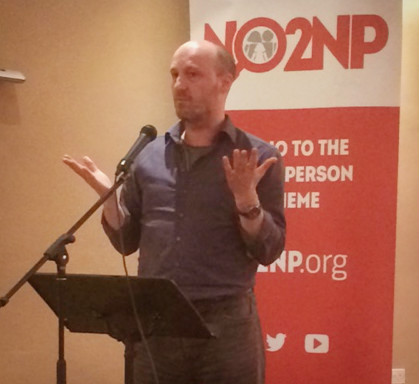
After Dr Stuart Waiton welcomed everyone, community paediatrician Dr Jenny Cunningham contended that children’s rights should not trump parents’ rights. “Parents are fully autonomous beings,” she said, “able to make their own decisions, while children are not. The principle of parental autonomy is fundamental to a democratic society.”
She went on to say that, far from respecting this parental autonomy, in recent years, social policy has seen parenting as “deficient” or “problematic” and there is a widespread consensus that the state has to intervene to address it.
Jenny emphasised that “there’s a world of difference between parental behaviour that puts children at risk of significant harm” and parenting that doesn’t fit the Government’s expectations.
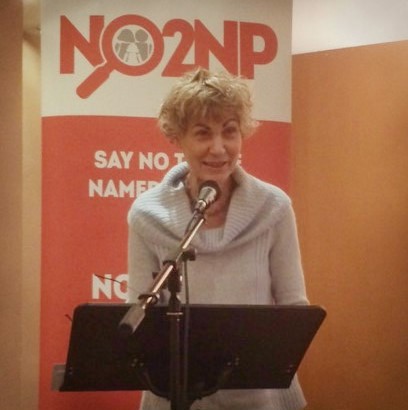
She said that “everything has been ‘GIRFEC’ed” [GIRFEC is the Government’s Getting It Right For Every Child framework] throughout health, education and social work. The legislation obligates all professionals to identify deficiencies in children’s lives and make decisions about whether their wellbeing is threatened and this is clearly seen in the new Universal Health Visiting Pathway, which will be introduced this August.
Jenny finished by saying that parenting isn’t a tick box list to be assessed by the state but a relationship between parent and child that grows at its own pace, as we are all individuals.
Lesley Scott from TYMES Trust then spoke about the recent decision of the Inner House of the Court of Session to reject our legal challenge. She quoted their use of the word “welfare” to describe the purpose of the legislation and showed how it is not interchangeable with “wellbeing”, but fundamentally different.

The Scottish Government has made this clear in their final statutory guidance, which states that “welfare and wellbeing are different, in that wellbeing is a broader, more holistic concept.” Even First Minister Nicola Sturgeon seems to be unsure about the purpose of the legislation, as she has said it is “about making sure that we are doing everything in our power to protect vulnerable children”. So, is it about child protection or children’s wellbeing?
On further scrutiny of the guidance, Lesley argued, there is “a dangerous conflation of the two [ideas]”, with the Information Commissioner’s Office conceding that there was a “lowering of the trigger” for data sharing from risk of “significant harm” to threat to “wellbeing”. This is confirmed in the guidance, which states that “a series of low level indicators of wellbeing need (whether obviously related or not) taken together can amount to a child protection issue”.
Lesley went on to point out, chillingly, that the guidance “is clear on the ability of Named Persons to use compulsion against parents and families who show any degree of non-engagement, non-compliance or mere ambivalence in the face of state functionaries’ opinions”. She went on to refer to sinister “compulsory supervision orders” which the guidance encourages Named Persons to use “at an early stage…to ensure compliance”.
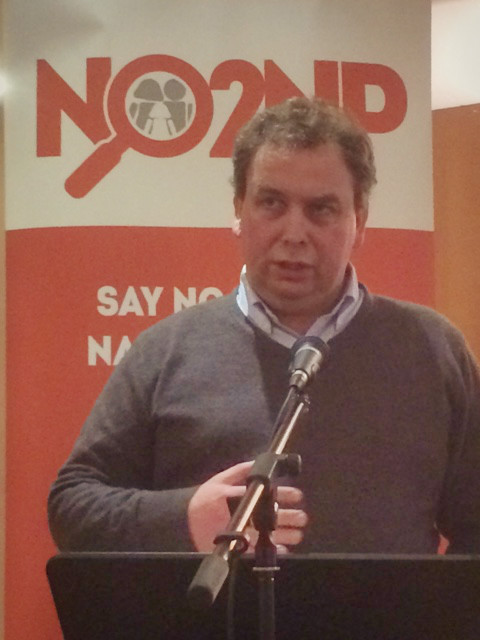
After a short video, CARE for Scotland’s Parliamentary Officer Gordon Macdonald, gave an overview of the passage of the Bill through Holyrood, stressing that it was really only children’s charities that were consulted and many of them tend to view families as potential problems. No consideration was given to religious liberty during the one morning given over to scrutinising the Bill, whose terms were applauded by the majority of the agencies invited to the session.
As a result, CARE and others involved in the NO2NP campaign, had no option but to go to court to seek to have the legislation overturned. Gordon suggested that the Court of Session had taken a “very optimistic view” of the legislation, but we were going to the Supreme Court in March and would, if necessary, go on to Strasbourg and Luxembourg, as the matter is so important.
Gordon concluded that there is a real risk of the scheme being operated in a “totalitarian” way, because individual children’s rights are being viewed in isolation from – and at times in opposition to – their relationship with their parents.
After some practical points were shared, there was an in depth Q&A, which brought out further revelations about the scheme, including that “wellbeing” was sometimes seen as whether children had sufficient “hope, love and spirituality” in their lives!
A dedicated group of volunteers will be in Falkirk’s High Street on Saturday morning for our latest Action Day, handing out flyers to shoppers and encouraging them to sign the online petition – if you are free to join us, please email volunteers@no2np.org.
NO2NP ROADSHOW: EDINBURGH
Posted 10 years agoThe large Salisbury Suite at the Macdonald Holyrood Hotel in Edinburgh was nearly filled to capacity on Tuesday morning for the first NO2NP Roadshow event since the summer break.
Dr Stuart Waiton of Abertay University in Dundee opened the meeting by saying that the autonomy of the family was being undermined by social policy across the board, with an overemphasis on “early intervention” by professionals to sort out children’s problems.
Liz Smith MSP then spoke about the huge mailbag she had received from people concerned about the scheme, which she says destroys the trust between families and professionals that is essential in bringing up a child.
She said that the scheme was “repugnant” and a “badly mistaken policy” that “diminishes resources”. The volume of support for the NO2NP campaign is growing all the time, with almost 12,000 people having now signed the petition. The appeal of the campaign “goes well beyond party politics” and the breadth of political views of those involved in it was “a good thing”.
She also pointed out that the bureaucracy of running the scheme would be enormous and too difficult to put into practice. The scheme has been “mis-sold” by the Government and the responses that concerned citizens have received have been “inaccurate” and “patronising”, she said. The Government, who are telling people how to live their lives, has not been shown in a good light, she added. In closing, Liz urged people to get involved, as it is “such an important campaign”.
Next up was Lesley Scott, Scottish representative for The Young ME Sufferers (TYMES) Trust.
She picked apart the three main arguments that have been used by the Scottish Government to justify the scheme:
1. “We’re doing all we can to help vulnerable children”
2. “We’re just formalising what we’ve been doing for ages”
3. “And Parents have asked for it.”
Lesley pointed out, firstly, that the word “vulnerable” does not appear anywhere in the legislation or the Government’s guidance and that their own QC admitted in the recent appeal case heard in the Inner House that every child is seen as potentially vulnerable. The corollary of this is that every parent is therefore viewed as potentially negligent or abusive. This will have a significant impact on how parents will be viewed and treated. If children, parents and associated adults do not agree with all of the Named Person’s views, then they will be treated as “non-engaging”: the balance has shifted dangerously in favour of the state.
The next argument – that local authorities are simply formalising what they have already been doing – has not been reflected in the attitudes of the professionals tasked with administering it, only a minority of whom think they currently have the capacity to gain an accurate and deep understanding of how to provide it.
And the contention that parents asked for the scheme is misleading at best, as parents with disabled children in the Highland region asked for a single, voluntary point of contact for accessing services. But that is not what they have got with the legislation and any success in the Highland Pathfinder has been shown to be down to other causes than the GIRFEC approach.
Lesley concluded by saying that the Government’s “disjointed excuses are shown to be a smokescreen and the true purpose of the legislation comes into view; it is a transfer of authority from your family to the state – an assault on the autonomous family unit”.
After a compelling new campaign video was shown, independent social work consultant Maggie Mellon spoke about her opposition to the scheme. She said that “parents are responsible for children’s upbringing, not services”, and that it is a very easy thing for professionals to display prejudice, when they don’t have the full picture. Civil servants have driven through this legislation but they haven’t thought through how dangerous it will be. People thought that they were getting a single point of contact, but that’s not what the legislation says. It doesn’t give parents or children the right to be consulted, as the Named Person is to take action “where he or she considers it to be appropriate to promote, support or safeguard the wellbeing of the child or young person”.
Commenting on the enormity of the universal scheme, Maggie remarked that “you can’t get all the sand on the beach through a little sieve”. A head teacher of a primary school isn’t going to have the time or the knowledge to explain your child’s needs to a range of professionals. Maggie said that she is against the Named Person scheme because “it’s wrong and it will cause damage”.
She said we should use the threat of compulsion far less than we do. She commented: “There’s too much compulsion and not enough compassion”. The Act moves the threshold from “at risk of significant harm” to “any concern about anything that might present a risk to a child’s wellbeing”. Instead of addressing the real needs of children, it is sinister surveillance. It’s not a point of contact for families to access services, she said, but a point for those services to access children. It’s as if the state is saying “We’re central, you’re peripheral”.
Nigel Kenny from The Christian Institute finished the formal session by taking everyone through the Action Packs that had been prepared for the meeting, before the usual lively Q&A finished off the meeting.
The next stop for the NO2NP Roadshow will be Glasgow on Monday 14th September at the Couper Institute, 86 Clarkston Road at 7.30pm – hope to see you there!
‘All children potentially vulnerable’, Scottish Government QC tells judge
Posted 10 years agoLast week’s appeal hearing rehearsed many concerning reasons why the Named Person scheme is not compatible with a free and democratic society, but perhaps the most revealing and worrying comment came from the Scottish Government’s QC.
Pressed by Lord Malcolm on why every child needed to have a Named Person, when not all of them were at risk, Alistair Clark QC, representing the Scottish Government, stated that every child was deemed to be “potentially vulnerable”.
Mr Clark’s words expose the thinking behind these intrusive plans.
A NO2NP spokesman said: “The assumption that all Scottish children are potentially vulnerable is patronising to all ordinary parents trying to do their best to bring up their children.
“The Scottish Government is saying to normal mums and dads that they all need the state to be a co-parent to stop them leaving their child potentially vulnerable.
“This unwarranted intrusion into family life is undermining and unnecessary.”
During the appeal hearing last week Aidan O’Neill QC, representing those bringing the legal challenge against the Named Person, addressed conflict between respect for the family and responsibility for the protection of children from harm.
He said there was no pressing social need requiring interference in the lives of every family and said: “The overwhelming majority of children are not neglected and the Named Person scheme subverts family life and supplants parents.”
He said: “We accept there is a legitimate state interest in the protection of the vulnerable, but this is not just dealing with the vulnerable, it’s dealing with all children.
“Most families do not need the state to get involved. Some parents – a tiny minority – do cause harm to their children but that does not justify appointing a named person to every child.”
Mr O’Neill pointed out that the Named Person scheme had been drawn up to promote children’s ‘wellbeing’ – a concept which, according to the Government, can include everything from mental health to a “wider vision of happiness”. He responded, “That’s what parents do and have done through the ages. It’s not the state’s job.
Mr O’Neill raised the concern that the central assumption behind the scheme is that “the state knows best”.
Petition officially launches on first NO2NP Action Day
Posted 10 years agoOn Saturday NO2NP officially launched its online petition to oppose the Scottish Government’s Named Person scheme. Volunteers took to the streets of Dundee to help raise awareness of the campaign by giving out leaflets to the public and gathering signatures for the petition.
A team of volunteers were also out in Kirkintilloch, the constituency of the Minister for Children and Young People.
The petition doubled in size over the launch weekend, and now has more than 4,500 signatures. Sign and share the petition here.
NO2NP Roadshow speakers Dr Stuart Waiton, a sociologist and lecturer at Abertay University, and Lesley Scott, from Tymes Trust, joined volunteers at the Dundee Action Day.
The Action Day and petition launch comes ahead of the appeal hearing by campaigners opposing the Named Person scheme, due to be heard in the Court of Session this Wednesday and Thursday.
A spokesman for NO2NP said: “We remain deeply concerned about the threats to the human rights of families to their privacy in their own homes as well as the breaches of data protection laws as the state passes confidential family information to and from different public bodies.
“The state thinks the named person – a health visitor, a teacher or other professional – can fulfil the role better than mums and dads which is ridiculous.
“It’s vitally important that the higher courts consider this issue, because it’s driving a coach and horses through parents’ rights and private family life.”
NO2NP Action Day: Dundee and Kirkintilloch, Saturday 30th May.
NO2NP Roadshow: Falkirk highlights
Posted 10 years agoFalkirk was the latest stop for the NO2NP Roadshow last night, when local supporters of the campaign were given the lowdown on the state guardian scheme.
Dr Stuart Waiton from Abertay University explained some of the key developments in social policy over the last 15 years in relation to child welfare. The concepts of abuse, vulnerability and early intervention have become deeply embedded in the minds of many strategists and there is a feeling that parents cannot advise their children properly without first receiving advice from professionals. This is known as “third way parenting”.
Lesley Scott, from TYMES Trust, pointed out that contrary to the contentions of Acting Minister for Children and Young People, Fiona McLeod, parents across the country did not ask for the Named Person scheme. Lesley went on to explain how the Scottish Government’s pilot of the scheme in the Highlands led to nearly 8,000 children (1 in 5) being put on a “child’s plan”.
During a lively Q&A session it was asked if teachers could opt out of being Named Persons. This was a very significant change in the terms and conditions of their employment, yet some of the teaching unions have yet to indicate their detailed views on this matter.
The Roadshow will be calling at the Elmwood Golf Club, Cupar at 7.30pm on Tuesday next week, when MSP Liz Smith hopes to be one of the speakers – do plan to join us, if you live in the area!
Dr Stuart Waiton TESS article: “Up close and personal”
Posted 10 years agoDr Stuart Waiton, a prominent opponent of the Named Person scheme, has voiced his concerns in an article in TES Scotland published on 22 May. With Dr Waiton’s permission, we have reproduced the article in full below.
“A RECENT blog could be a sign of things to come as the Scottish government’s ‘named person’ legislation kicks in.
The posting, written by an irate mother of a 13-year-old in Aberdeen, complains about a nurse- not the usual school nurse- having a ‘little chat’ her daughter.
The questions the girl was asked included, ‘Have you started your menstrual period?’, ‘Do you feel loved and cared for?’ and ‘Do you feel safe and secure in your home?’
The questions continued, probing about the pupil’s relationship with her mother. The child began to feel uncomfortable. When the mother found out, she was ‘absolutely RAGING’.
The interview was part of the named person project, a system whereby every child in Scotland will be given a named guardian to oversee their safety and wellbeing – an initiative that could transform the relationships between schools and parents.
A key problem with the named person set-up is that teachers will now be responsible – and trained to be responsible – for the ‘wellbeing’ of every child.
This may sound fair enough, but the breadth of meaning the term well-being can encompass suggests that the roles of parent and teacher will be confused. So, for example, everything from how respected a child is by their carers to how much responsibility they are given by them could become a matter of concern and intervention.
Given the emphasis placed on being aware of ‘risks’ and the potential anxiety about not flagging up a problem early enough, the likely trend is for more and more children to be investigated and put on a children’s plan.
When defending the named person legislation, first minister Nicola Sturgeon and others argue that this is about protecting the most vulnerable children, but this is disingenuous. This is a universal service that is trying to prevent problems occurring in the future, and doing so by massively increasing the basis upon which teachers’ concerns and suspicions trigger action. Consequently, all sorts of emotional or personal issues that would previously have been seen as aspects of growing up, or as issues for the family, will become a legally enforced matter for the named person – for teachers.
Teaching unions have said little about this subject so far – a surprising state of affairs given the seriousness of this development and the pressures that will be placed on senior staff in particular to take on this new role.
Worryingly, as parents find out about the named person system, it is likely that some will begin to treat teachers with suspicion and fear, nervous about sharing personal information with them or discussing difficulties their children are having at home.”
Dr Stuart Waiton is a senior lecturer in sociology and criminology at Abertay University.
Announcing new Roadshow dates for May and June
Posted 10 years agoWe are pleased to announce more NO2NP Roadshows coming up in May and June.
Supporters from across Scotland often contact our team requesting a NO2NP Roadshow in their area and we do our best to try and make it happen.
Let us know if you would like one in your area by emailing: admin@no2np.org
It’s still surprising how many people are unaware of the Named Person legislation. Help us spread the word by telling people about the Roadshows. Experts will be sharing about the background to the plans and concerns surrounding the scheme.
DOWNLOAD AND SHARE THE FLYER
NO2NP Roadshow: Aberdeen highlights
Posted 10 years agoThe latest NO2NP Roadshow event was held in the Aberdeen Arts Centre on Monday (11th May), where one local woman’s run in with an emanation of the Named Person scheme at her daughter’s school was raised during Q&A as a matter of concern. Even more concern was expressed when it was revealed that a GP would be obliged to share confidential patient details about, for example, a mother’s struggle with depression with her child’s Named Person.
After a video was shown about the judicial review in the Court of Session, Abertay University sociology lecturer Dr Stuart Waiton spoke about the disjuncture between the people and the powerful and how, over the past century, children were no longer being seen in the context of their families and government was increasingly seeing its role as one of “risk management”.
Lesley Scott of Tymes Trust then made reference to the quote in a recent newspaper article by Acting Minister for Children and Young People that the Named Person legislation “is about making sure that we are doing everything in our power to protect vulnerable children.” Lesley then pointed out that the word ‘vulnerable’ does not appear anywhere in the legislation or in the draft statutory guidance. Instead, she said “this legislation is about measuring the wellbeing of each and every child.”
Some practical points on how people can be involved in helping the NO2NP campaign were then shared by Nigel Kenny of The Christian Institute, before a lively Q&A, always one of the high points of these Roadshows.
Our next event is in Elgin this coming Monday (18th May) at the Laighmoray Hotel, Maisondieu Road, Elgin, IV30 1QR at 7.30pm – please do come along and find out more about the campaign.
NO2NP Roadshow: Edinburgh highlights
Posted 10 years agoOn 23rd April the NO2NP Roadshow hosted a well-attended meeting in Portobello on the outskirts of Edinburgh. Dr Stuart Waiton chaired the event and spoke of the decline in the view of the family as an intrinsically good institution, instead it is now seen as the source of most children’s problems.
The first speaker was social work consultant Maggie Mellon, who said that it was “absurd” to assume that every child in a family “is potentially at risk and that information must be shared equally about all of them just in case”.
Then Lesley Scott of Tymes Trust, representing families of young ME sufferers, spoke about the shift in the Named Person legislation to focus on wellbeing meaning that “the threshold for intervention in a child’s life has been drastically lowered from ‘at risk of significant harm’ to that of a worry over something as intangible as wellbeing. This means that significant decisions are open to personal interpretation and bias on the part of the named person.”
Finally, Nigel Kenny of The Christian Institute gave some practical points, as well as an update on the judicial review appeal, which has now been fast-tracked to be heard by the Inner House on 3rd and 4th June.
NO2NP ROADSHOW: GLASGOW HIGHLIGHTS
Posted 10 years agoThanks to everyone who joined us in Glasgow for the NO2NP Roadshow. Representatives from the campaign shared about the many concerns surrounding the Named Person scheme.
Dr Stuart Waiton, a Sociology lecturer at Abertay University, expressed his unease about society’s increasing obsession with child safety and warned that “the autonomous family doesn’t exist any more”.
Lesley Scott of TYMES (The Young ME Suffers) Trust talked about how the Named Person scheme had its origins in the Scottish Government’s GIRFEC (Getting It Right For Every Child) principle. She also explained about the Government’s “Wellbeing Wheel” and “SHANARRI” indicators and revealed that in the Highland pilot nearly 8000 children (1 in 5) were put on a “child’s plan”.
Quoting Jane Colby, Executive Director of TYMES Trust, Lesley said “families appear to be facing an arbitrary, punitive, threatening and destructive state juggernaut” in this legislation. She concluded by warning: “This is state-mandated parenting, which obligates a state employee to carry out statutory duties, which are primarily the responsibility of parents”.
Anne Cannon, a mother of five, said she first heard about the issue through a radio phone-in and presented her two major concerns as a parent. Firstly she warned about the negative impact she believes it will have upon the relationship between parents or carers with health visitors and teachers, and secondly she said she fears that children who do actually need help may be missed.
Michael Veitch of The Christian Institute, one of the groups backing the NO2NP campaign, shared practical pointers on how people can help oppose the Named Person scheme. He also announced a new NO2NP petition which can be accessed at no2np.org. Speaking about the Scottish government’s draft guidance on the scheme, he said that it “completely fails to make reference to fathers”.
NO2NP Roadshow in Dingwall
Posted 10 years agoThank you to everyone who came to the NO2NP roadshow meeting in Dingwall Town Hall last Wednesday (4 March).
A large crowd heard Lesley Scott (Tymes Trust) explain that the named person role has expanded beyond the idea of a single point of contact and usurps the natural rights of parents. She warned that the named person has lowered the threshold for intervention based on the ‘SHANARRI’ indicators and branded the scheme as “state mandated parenting” and an oppressive intrusion into family life.
The crowd also heard from Alison Preuss (Schoolhouse) who noted that the Isle of Man abandoned a similar scheme after a melt-down in social work, She said it was a scandal that resources were being diverted into a universal scheme.
On Monday 23 March the NO2NP roadshow returns to Glasgow for a meeting at the Hilton Glasgow Grosvenor Hotel in the West End where the audience will hear from Dr Stuart Waiton (Abertay Univeristy) and various others. The meeting will start at 7:30pm and is free and open to all. We hope to see you there.
NO2NP Roadshow update
Posted 10 years agoLast night (26 Feb) the NO2NP roadshow visited Cumbernauld. The event was chaired by Dundee-based sociologist, Dr Stuart Waiton, who spoke about the spiralling bureaucracy in health and safety.
The first speaker was community paediatrician, Dr Jennifer Cunningham, who explained the ‘SHANARRI’ wellbeing indicators. She noted that vulnerability had been widened considerably, with factors such as inactivity, poor nurturing and irresponsibility being examined, rather than simply abuse or neglect. She said many parents were losing confidence in their ability to raise children.
Next up was Lesley Scott of Tymes Trust, representing families of young ME sufferers. She examined the wellbeing indicators in more detail, and emphasised that there was no opt out from the named person. She voiced concern that non-engagement will lead to further interventions and said the scheme was state-mandated parenting.
The next NO2NP roadshow will be in Dingwall Town Hall on Wednesday 4th March at 7:30pm. Speakers will include Alison Preuss of Schoolhouse and Lesley Scott. Hope to see you there – all are very welcome.
NO2NP Roadshow update: Dunfermline, Cumbernauld
Posted 10 years agoDr Stuart Waiton (Abertay University) was in the chair for a very well attended NO2NP roadshow at the Carnegie Conference Centre, Dunfermline on Wednesday 11 February.
Dr Waiton reiterated his view that child safety policy isn’t rational and that it is spiralling out of control. He described the potential for intervention as “astronomical”.
The first speaker was prominent NO2NP supporter, Liz Smith, who is an MSP for Mid Scotland & Fife. She explained her two fundamental objections to the named person scheme. First, the lack of trust in families and the fact that parents don’t want someone to tell them what to do. Second, that the focus of resources must be the vulnerable children who need help, not a universal service. She said that the legislation is “wrong” and the named person scheme is “unworkable”.
Next up was Lesley Scott, spokesperson for Tymes (Young ME sufferers) Trust – one of the organisations behind the recent judicial review of the legislation. She noted that the named person scheme is universal with no opt-out.
The next NO2NP roadshow takes place in CUMBERNAULD (Westerwood Hotel) on Thursday 26 February at 7:30pm. Speakers will include community paediatrician Dr Jenny Cunningham and Lesley Scott of Tymes Trust.
Named Person a risk to vulnerable children
Posted 10 years agoLast Wednesday night (21st January) the NO2NP roadshow resumed for the first meeting of the new year at Howden Park Centre in Livingston, West Lothian – the constituency of the new Education Secretary, Angela Constance, whom those present were urged to contact.
The main speaker of the night was Lesley Scott of Tymes Trust, who represent young ME sufferers. She said that the Children & Young People (Scotland) Act fails to allow for non-engagement, despite a ministerial assurance to the contrary.
The audience also heard from Bonnybridge-based father of four, James McIntosh, who told how he had received a letter from NHS Forth Valley saying that all his children have a named person who would be sent future letters and reports. As a result of press involvement, NHS Forth Valley backed down.
The meeting was chaired by Dr Stuart Waiton from Abertay University in Dundee, who said that the named person policy is sold on the basis that it will keep children safe, while stating his view that the policy is in fact detrimental to children who do need support.
This same theme was highlighted in a story in the Sunday Express newspaper over the weekend, relating to concerns raised by a senior police officer. According to the paper:
“Assistant Chief Constable Malcolm Graham told ministers and senior officials that the named-person scheme could see the ‘focus’ of child protection efforts moving away from ‘high-risk children’. The comments emerged in the minutes of a Scottish Government meeting, but a spokesman said they could not offer any further clarification as ‘no detailed notes were taken’.”
The paper went on to report that it had “lodged a Freedom of Information request asking for more details, but the Scottish Government has been unable to comply.”
The next dates for the NO2NP roadshow are Greenock (Beacon Arts Centre) on 5 February and Dunfermline (Carnegie Conference Centre) on 11 February. Both events begin at 7:30pm and are free of charge. We hope to see you there.
NO2NP Roadshow comes to Perth
Posted 11 years agoLast night (12th November) the NO2NP roadshow visited Perth, which was the seventh meeting since the roadshow kicked off back in August. The meeting also coincided with the ongoing judicial review of the named person legislation, taking place this week at the Court of Session in Edinburgh.
The main speaker was Dr Stuart Waiton of Abertay University. Dr Waiton spoke about how the idea that children are vulnerable and “at risk” has escalated in recent years and that there is an expectation that parents need guidance and support. He argued that there is very little recognition of the importance of privacy and that families have become increasingly “invisible” in social policy and law, with the term not being mentioned at all in the Children & Young People Act.
The meeting was also addressed by Lesley Scott from Tymes Trust, who work on behalf of young people with ME. She said that the named person usurped the rights of parents and had lowered the threshold for intervention. She branded the scheme “oppressive”, “illegal” and an “intrusion into family life”.
The NO2NP roadshow continues in two weeks’ time in Montrose on 26th November, where speakers will again include Lesley Scott and also Alison Preuss of Schoolhouse. More details available here.
**If you were planning to attend the court hearing this week and expected to find details on our website, unfortunately the demands on the court meant larger court rooms were unavailable. The court room assigned to the case only has a very small public gallery.**
NO2NP Roadshow review: Aberdeen & Irvine
Posted 11 years agoThe two latest outings of the popular NO2NP roadshow were in Aberdeen on 15th October and Irvine, North Ayrshire on 23rd October.
At the Aberdeen meeting, supporters heard from Liz Smith MSP, Young People spokesperson for the Scottish Conservatives. She described the named person policy as “slightly sinister” and argued that resources would be diverted away from the most vulnerable, hence defeating the purpose of the policy. She also said it was ridiculous that children aged over 16, who were recognised as adults, still required a named person.
Next up was Maggie Mellon, a consultant and writer on social work and children/family issues. She said that government shouldn’t get involved in parenting, and lamented a preoccupation with risk and safety.
The audience were also addressed by Lesley Scott, representing Tymes Trust, who work with children suffering from ME. She said it was unclear what will happen when parents and the authorities disagree and that it would be a “minefield” for parents who choose not to engage. She also explained that the threshold for intervention had been lowered from risk of significant harm to the ‘SHANARRI’ indicators.
In the chair for the evening was Dr Stuart Waiton, a sociologist from Abertay University, Dundee, who expressed his concern that children may go to their named person to complain about their parents and that the authority of parents and families could be undermined.
The meeting in Irvine was addressed by Glasgow-based community paediatrician, Dr Jenny Cunningham, who explained that every child in Scotland would be assessed through the ‘SHANARRI’ indicators and that the legislation would oblige all health, education and social work professionals to identify any deficiencies in parenting and to arrange intervention. She also spoke of her concern about the impact of the named person on family life and said that parents were intimidated by the idea.
The next talk was given by Anne Cannon, a Glasgow-based mother of five, who said her two main concerns with the named person policy were the negative impact it would have on the relationship between parents and state agencies, and the fact that it would fail the very people the policy is meant to help.
The meeting was also addressed by local man, Councillor Tom Marshall, who sits on North Ayrshire Council. He spoke about the appalling ‘ChildrenCount’ surveys which have been operating in North Ayrshire and outlined some of the questions being asked of youngsters.
The next stop for the NO2NP roadshow will be PERTH (Salutation Hotel) on 12th November at 7:30pm, followed by MONTROSE (Park Hotel) on 26th November at 7:30pm. We hope to see you there.
NO2NP roadshow comes to Inverness
Posted 11 years agoThe NO2NP roadshow resumed last night (1 October) with a well attended meeting at Glenmoriston Town House in Inverness. This was the first time that the roadshow had visited the Highlands, which is where a pilot version of the named person scheme has already been implemented.
The meeting was chaired by Dr Stuart Waiton of Abertay University who argued that “parenting has been professionalised” and ridiculed the SHANARRI “wheel of misfortune” used to assess child ‘wellbeing’.
The first speaker was Maggie Mellon, an independent consultant and writer on social work and family issues, who said the legislation “represents a denial of families”. She noted that family isn’t mentioned in the legislation and that families are seen as caretakers on behalf of government, adding that “the state makes an absolutely lousy parent”. She argued that “there is no evidence to support the imposition of named persons” and predicted “a huge misuse of resources”.
Next up was Alison Preuss, Co-ordinator and Press Officer at Schoolhouse Home Education Association, who said that “children’s rights are being selectively applied”. She told the audience about the infamous ‘Evidence2Success’ and ‘ChildrenCount’ surveys which have been operating in different parts of Scotland. She also discussed the Highland named person pilot scheme, describing it as “very selective” and said that those parents in Highland who have complained have been ignored.
The meeting ended with an extremely lively and informative question and answer session.
The next date for the NO2NP roadshow is Wednesday 15th October in Aberdeen – full details available here.
NO2NP Roadshow: 3 more dates in October
Posted 11 years agoFollowing on from the success of the initial ‘No To Named Persons’ (NO2NP) roadshow meetings during August (in Glasgow, Dundee and Stirling) the tour resumes in October with three more dates. These are:
INVERNESS – Wednesday 1 October @ Glenmoriston Town House, 20 Ness Bank
ABERDEEN – Wednesday 15 October @ ACT Aberdeen, 33 King Street
IRVINE – Thursday 23 October @ Gailes Hotel, Marine Drive
Events will feature contributions from a range of experts such as Dr Stuart Waiton (Abertay University), Maggie Mellon (social work consultant/writer) and Dr Jenny Cunningham (Community paediatrician). There will also be an extended time of discussion where attendees can put their questions to the speakers.
All events will begin at 7:30pm, are free entry and open to all.
Please come along and spread the word.
NO2NP roadshow visits Stirling
Posted 11 years agoThe No to Named Persons (NO2NP) roadshow arrived in Stirling on Friday 29th August for the third instalment of the current tour.
The lunch time meeting, held in a city centre hotel, was once again well attended and included a feisty and informative question and answer session with the speakers.
In the chair was Dundee-based sociologist, Dr Stuart Waiton, who told the audience: “To have a universal provision seems very problematic to me.”
As in Dundee two nights earlier, the subject of the controversial child wellbeing surveys being conducted in three Scottish local authorities – known as ‘ChildrenCount’ – was raised. Alison Preuss of Schoolhouse, the home education group who are backing NO2NP, said: “It’s not about child protection. It’s about gathering information.”
The main speaker was Liz Smith MSP, who represents Mid Scotland & Fife (which includes Stirling) at Holyrood. She told the audience: “I am fundamentally opposed to this named person policy. It is morally wrong. There is this assumption that you can’t be trusted. I find this deeply unnerving.”
The meeting also heard from Falkirk-based father of four, James McIntosh, who was recently told by the local health board, NHS Forth Valley, that a named person had already been allocated for his children – albeit he was never informed who the named person actually was. Mr McIntosh said: “One size fits all doesn’t work…In the Bill there isn’t a single mention of the parent”.
NO2NP roadshow visits Dundee…as ‘ChildrenCount’ survey rolled out in city
Posted 11 years agoThe second instalment of the NO2NP roadshow took place on the evening of Wednesday 27th August in Dundee city centre. Around 50 campaigners and members of the public gathered to hear the powerful case against the Scottish Government’s named person policy.
A particular focus of discussion on the night was the troubling new ‘ChildrenCount’ surveys currently being rolled out in Dundee, details of which (including links to the surveys themselves) can be found here: Improving Children’s Outcomes
The meeting was chaired by Dr Stuart Waiton, a sociologist based at nearby Abertay University.
The main speaker of the evening was Liz Smith MSP, who spearheaded the opposition to the named person policy during the passage of the legislation through Holyrood. She said:
“It grates on me that somebody else, appointed by the State, is responsible for your child. The vast majority of parents do not need to be told by the government how to look after their family. I don’t think parents want this and I don’t think they know it’s happening.”
Speaking about the oft-cited pilot scheme in the Highlands, she added: “I don’t see the compelling evidence that in Highland Council this has actually worked.”
The meeting was also addressed by Lesley Scott of Tymes Trust, who work with young ME sufferers. She made clear that parents who refuse to engage with the system will inevitably find that action will be taken against them and explained that: “a named person is allowed to access your child’s confidential records.”
The NO2NP roadshow moves on to Stirling on Friday 29th August, then Inverness on 1st October. More details can be found here.
NO2NP Roadshow kicks off in Glasgow
Posted 11 years agoFollowing on from the hugely successful launch of the No to Named Persons (NO2NP) campaign in Edinburgh back in June, the NO2NP roadshow kicked off in Glasgow last Thursday night (21 August).
A large crowd gathered at the St Mungo Museum of Religious Life & Art, close to the city centre, to hear various speakers explain why the Scottish Government’s plan to furnish every child in Scotland with a state-appointed named person is woefully misguided and has the potential to cause significant damage to ordinary families.
The meeting was chaired by Dr Stuart Waiton, a sociologist from Abertay University. Highlighting the importance of the campaign, Dr Waiton told the meeting: “I expect 90% of parents in Scotland don’t know this law exists.” He also condemned the current obsession with child safety issues, remarking that: “there is an unhealthy anxiety about child safety.”
A keynote speaker was Maggie Mellon, an independent consultant and writer on social work and child issues. She said the legislation “represents a denial of families” adding that “we have separated children and their rights from families and their rights”.
She was followed by Dr Jennifer Cunningham, a Glasgow based community paediatrician, who argued that the legislation would have the “effect of obliging all professionals to identify deficiencies in parenting and arrange intervention.”
This was echoed by mother of five Anne Cannon, who said: “I don’t believe this legislation will empower parents.”
The audience also participated in a wide ranging discussion with the panellists.
The next stop for the roadshow is Dundee this Wednesday (27 Aug), followed by Stirling (29 Aug) and Inverness (1 Oct), with further dates likely. Full details are available on the NO2NP website.
Dr Stuart Waiton: Named Person law ‘degrades the very meaning of privacy’
Posted 11 years agoBy Dr Stuart Waiton, a sociology lecturer at Abertay University, writing in a personal capacity.
Here he expresses his deep concerns about the named person provisions of the Children and Young People (Scotland) Act.
About 10 years ago, I decided to write a dystopian novel about a future where the idea of privacy had completely collapsed, where each child born was given a live-in “support worker” who helped the parent manage the difficult child while ensuring the child was safe from the parent’s problematic behaviour. The very idea of private intimacy and personal responsibility no longer existed in this futuristic dystopia, where safety had become the only principle and all relationships were now mediated through a state-paid professional.
Of course the book was never written and now, following the passing of the new Children and Young People (Scotland) Act, it has become almost obsolete because it is no longer a futuristic fantasy that every child will have their own “support worker” assigned at birth. It is to become a lived reality.
The new act will mean that, from birth, each child in Scotland will have a specific state-appointed professional, a ‘named person’, to oversee their interests, and in particular, to oversee their safety. Initially this named person is likely to be a health visitor or midwife, the role later being taken over by school teachers who will have the “duty” and responsibility to act as the child’s guardian. The regulation of data-sharing between professionals is also to be loosened and the guardians will have new legal authority to access data from the police, local authority council, NHS files and even, potentially, information accessed from Young Scot (leisure) Cards.
The children’s minister, Aileen Campbell, has been dismissive of those parents groups who have raised concerns about “state snoops”, or who, like the various Christian groups opposed to the idea, have described the new law as an “attack on the family”. For Campbell, the new powers and duties being given to the state guardians are simply another service to both help families in trouble and also to further ensure that children are protected in society. Indeed, Aileen Campbell at times appears to be nonplussed by her critics, incapable of seeing why her caring approach is not simply celebrated. The idea of state snoops undermining the family, she argues, is simply “misunderstandings” and “misrepresentations” of the new law. Somewhat comically, when quizzed about the state’s overbearing intrusion into the home represented by the new act, Aileen Campbell replied, without a hint of irony, that “we recognise that parents also have a role” in looking after their children. Also?
However, given the increasing way in which all children are today being categorised as ‘vulnerable’, where all professionals are being educated to put child safety at the top of their agenda and when ‘early intervention’ is promoted as the only rational approach to solving social problems, there is a serious risk that the relationship between the ‘named person’ and parents will become one predicated upon suspicion. Given that the trigger for intervention into a child’s life is also being down-graded to concerns about ‘well-being’, rather than when a child is at serious risk of harm, the potential for unnecessary and potentially destructive state intrusion into family life is significant.
The Scottish government appears to be blind to the potential this new act has for transforming the relationship between parents and the state, and for degrading the very meaning of privacy. Likewise the potential this approach has for sullying relationships between teachers (who will be the main state ‘named person’) and parents, is ignored. Tragically, the danger is also that by incorporating every single child into the child safety rubric, the very few children who need state intervention in their lives will become lost. As one concerned parent has noted, when you are looking for a needle in a haystack, why make the haystack bigger?






